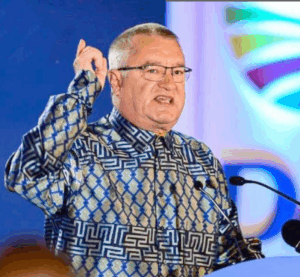The future of KwaZulu-Natal (KZN) depends largely on its agricultural sector. It is the backbone of our province, vital not only for our economy but for the very essence of our rural identity. As KZN’s new government of provincial unity (GPU) navigates the challenges and opportunities ahead, it must scrutinize and fortify its approach to agriculture.
Amongst the pressing concerns that the DA wants to highlight is the financial allocations to state veterinary services. Over recent years, there has been a lack of substantial investment in this sector. While the reasons for this – including budget cuts and austerity measures – are understandable, it is concerning that the little that is available is not being spent progressively. The efficiency and impact of this spending warrants closer examination and the DA is committed to playing its role. Every rand spent contributes meaningfully to disease control and safeguarding livestock while our farmers deserve to have confidence in a robust agricultural system that effectively manages and mitigates veterinary risks.
Disease control remains a persistent challenge in KZN’s agricultural landscape. Outbreaks of diseases such as Foot-and-Mouth and African Swine Fever threaten livestock and jeopardize our food security and economic stability. There must be a comprehensive and proactive strategy for disease management. This includes strengthening surveillance, improving rapid response capabilities, and fostering collaboration between public and private sectors to address and contain outbreaks swiftly.
After recently being announced as KZN’s DA Spokesperson on Agriculture and Rural Development (DARD), I received 37 requests in one day from distressed small-scale farmers in places such as Pongola, Kokstad, uMzinyathi, etc. Most of their requests were pleas that they had for years been trying to get access to communal dips to ensure their livestock was well taken care of. These are the quick wins that KZN’s government of provincial unity (GPU) can focus on to rebuild confidence in this department.
Equally important is the support provided to emerging farmers such as these. As new entrants into KZN’s agricultural sector they are the lifeblood of future growth and innovation. However, they often face significant barriers, including limited access to capital, technical expertise, and markets. Government – and in this case KZN’s DARD must increase investment in training programs, financial support, and mentorship schemes to empower these farmers. By providing them with the necessary tools and knowledge, our GPU can foster a new generation of agricultural entrepreneurs who will drive the industry forward.
Xola Sibisi is a 30-year-old farmer from eMbali in Msunduzi. She runs a small-scale farm called Ntombikhona Farming. She has received support from the private sector but very little support from the department. It is time to meet the private sector halfway if we are to create an agricultural economic environment that is conducive to growth.
On the topic of commercial farming, the GPU must focus on expansion and enhancement. KZN has the potential to be the continent’s breadbasket. To realize this vision, it must adopt a growth strategy that embraces modern agricultural practices, leverages technological advancements, and opens new markets. Commercial farming must be elevated to not only meet local demands but to position KZN as a major supplier on the global stage and the DA supports calls for the inclusive transformation of this sector through constitutional redress.
It is therefore great news to hear Minister of Agriculture, Rural Development and Land Reform John Steenhuisen when he says;
“The Department of Agriculture developed the Blended Finance Scheme (BFS) to increase access to affordable finance for black producers in the agriculture and agro-processing sector, as part of our commitment to the Agriculture and Agro-8 processing Master Plan (AAMP). Blended finance involves the provision of grants by the state and loans by private finance institutions, including development banks.
To date, the department has successfully partnered with the IDC, the Land Bank, and ABSA, and is concluding agreements with FNB, Nedbank, and SEFA. Since March 2021, through the BFS, R3.107 billion has been invested in the agricultural sector for the development of 183 commercial black producers, with R1.204 billion of this being grants.
As of 31 March 2024, the IDC approved 29 transactions worth R1.915 billion, with R587 million in grants, creating 1,445 jobs. The Land Bank approved 154 transactions worth R1.192 billion, with R617 million in grants, creating 1,973 jobs. ABSA signed the agreement with the department on 16 May 2024 and is currently conducting internal roadshows and change management to prepare all its branches for the implementation of the BFS. The department and ABSA will soon announce the date of implementation by ABSA”
These are the public-private partnerships needed in KZN. The question is: What is the role of Ithala Bank? And why are we not doing this progressively in our province? We congratulate Minister Steenhuisen and wish him well as he endeavours to reshape the agricultural landscape of our country.
To illustrate what is possible, we must consider Texas, whose agricultural economy is now larger than that of the entire continent of Africa. This remarkable achievement is a direct result of significant investments made in the mid-1990s and the comprehensive support provided to farmers. Texas focused on modernizing infrastructure, adopting cutting-edge technology, and supporting farmers through grants, subsidies, and research initiatives. This approach has transformed the state into a global agricultural powerhouse, demonstrating the profound impact that strategic investment and support can have on an agricultural economy
To achieve this, KZN’s GPU must devise and implement a robust growth strategy for rural development. Our rural towns face decline due to dwindling economic opportunities and outmigration. Agriculture can be a catalyst for reversing this trend. By investing in rural infrastructure, improving access to markets, and promoting agro-processing industries, we can breathe new life into our rural communities. Agriculture has the power to generate employment, stimulate local economies, and enhance the quality of life for those living in these areas.
In the lead-up to the 2024 election, as the provincial premier campaign manager I travelled with Mayor Chris Pappas extensively. One day we met a young man in the Durban CBD. He told us how he was living in the equipment room of a mortuary because he needed to be in Durban to find work. He had left his home in Ladysmith and would walk around town searching for work. The owner of the morgue gave him shoes that were abandoned by the family of a dead man some time ago.
This young man’s name is Sphesihle. Due to a lack of economic opportunities in our rural towns and villages, he was an economic migrant walking around in a dead man’s shoes. I will never forget the look of despair in his eyes but more than that the feeling of helplessness at the time because as a government and department we were failing him.
The right policy framework is essential to facilitate transformation. We need targeted initiatives that address the specific needs of our rural populations. This includes enhancing transportation networks to connect farmers with markets, supporting rural education and training programs, and incentivizing investment in rural businesses so we can localize employment and not concentrate it in Durban, Pietermaritzburg, and Richards Bay. By focusing on these areas, we can create a thriving agricultural sector that acts as a vehicle for comprehensive rural development.
The future of agriculture in KZN hinges on government’s ability to address current challenges while seizing new opportunities. It must ensure the effective use of resources in veterinary services, strengthen disease control mechanisms, and provide robust support to emerging farmers. It must expand commercial farming and devise a strategic approach to rural development.
KZN’s GPU needs to build a resilient agricultural sector that not only sustains our province but elevates it as a beacon of agricultural excellence across the continent.








